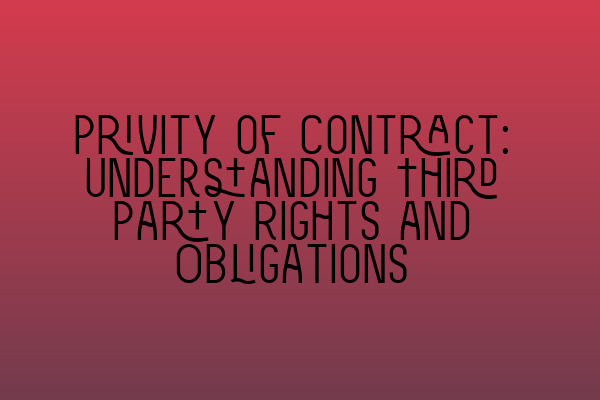Privity of Contract: Understanding Third Party Rights and Obligations
In the complex world of contract law, the legal concept of privity plays a crucial role in determining the rights and obligations of parties involved in a contract. Privity of contract refers to the principle that only the parties who have entered into a contract are bound by its terms and are eligible to enforce or be held liable for its provisions. This means that third parties, who are not direct parties to the contract, generally do not have any rights or obligations under the contract.
To better understand the concept of privity of contract, let us delve deeper into its various aspects and explore its implications for both contracting parties and third parties.
Key Elements of Privity of Contract
1. Intention to Create Legal Relations: For a contract to be enforceable, there must be an intention between the parties involved to create a legally binding relationship. This requirement ensures that contracts are not entered into lightly, and parties understand the legal consequences of their actions.
2. Mutual Consent: Mutual consent is a fundamental aspect of any contract. It implies that all parties involved have freely and voluntarily agreed to the terms and conditions set forth in the contract. Without mutual consent, there can be no valid contract.
3. Consideration: Consideration refers to something of value exchanged by the parties to a contract. This can be in the form of money, goods, services, or even a promise to perform or refrain from performing a certain act. Consideration is essential for a contract to be legally enforceable and is often used as evidence of the parties’ intention to be bound by the contract.
Implications of Privity of Contract
The privity rule has significant implications for both contracting parties and third parties. Let us examine these implications in more detail.
1. Contracting Parties:
The rule of privity protects the rights and obligations of the parties who have willingly entered into a contract. It ensures that only these parties can enforce or be held liable for the terms of the contract. This principle provides parties with certainty and allows them to have confidence in the enforceability of their agreements.
For example, if John enters into a contract with Susan to purchase her car, only John and Susan will have rights and obligations under the contract. This means that John can enforce Susan’s promise to sell the car, and Susan can enforce John’s promise to pay the agreed-upon price. Any third party who is not a direct party to the contract, such as Jane who is a friend of Susan, cannot enforce the terms of the contract or be held liable under its provisions.
2. Third Parties:
As mentioned earlier, the privity rule generally prevents third parties from having rights or obligations under a contract. However, there are exceptions to this rule that allow certain third parties to benefit from or be bound by a contract.
One such exception is when the contract contains a provision expressly conferring a benefit on a third party, known as a third-party beneficiary. In such cases, the third party can enforce the contract and claim any rights or benefits conferred upon them. For instance, if John enters into a contract with Susan to build a house for Susan’s daughter, the daughter can enforce the contract and claim the benefits of having the house built according to the agreed-upon terms.
Another exception arises in cases where a third party has become a trustee or an assignee of a contractual right. In such circumstances, the third party may have the ability to enforce the rights arising from the contract. However, it is important to note that the privity rule remains the general rule, and exceptions are relatively rare and require specific circumstances to be satisfied.
Conclusion
Understanding the concept of privity of contract is crucial for anyone involved in the formation or enforcement of contracts. The privity rule serves as a cornerstone of contract law, ensuring that the rights and obligations of parties are protected and enforceable. While it may limit the ability of third parties to claim rights or be held liable under a contract, certain exceptions exist that allow third parties to benefit from or be bound by a contract.
For more information on legal concepts and the legal profession, check out these related articles:
– Barrister vs. Solicitor: A Comprehensive Comparison
– Exploring Different Solicitor Specializations: Finding Your Niche
– Embracing the Rise of Virtual Law Practices
– Unveiling Real-Life Case Studies: Insights into Legal Practice and Decision-Making
– Exploring Solicitor Salaries in the UK: Average Earnings and Factors Affecting Income
Remember, privity of contract is a fundamental concept in contract law, and understanding its implications is vital for both legal professionals and anyone involved in contractual relationships.
